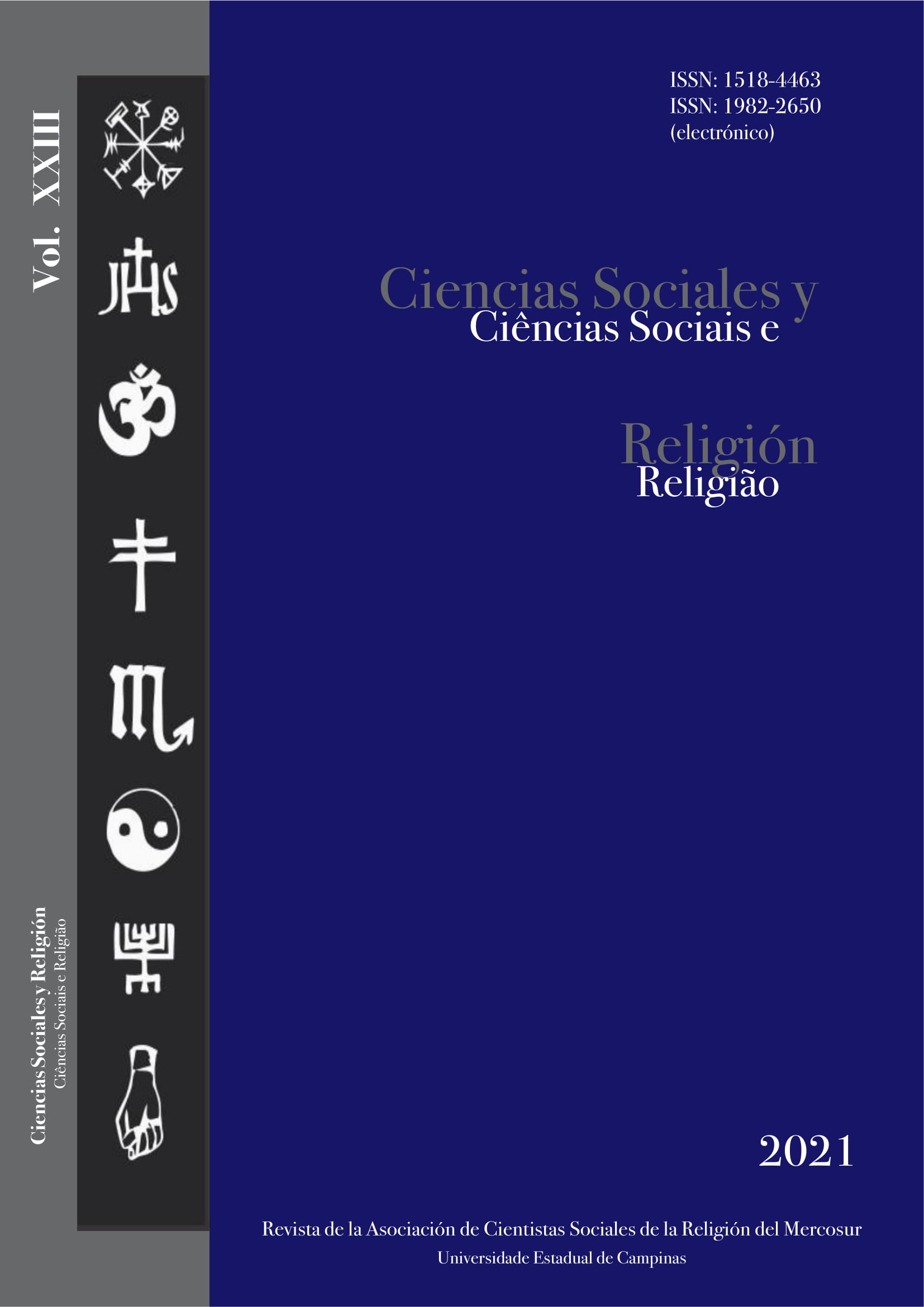Resumen
Este trabajo aplica el marco teórico del mercado religioso para examinar el panorama religioso de Lituania como campo hegemónico en el que el catolicismo dominante se considera parte integrante de la identidad nacional. El interés de la investigación se centra en explorar el movimiento etno-pagano Romuva y sus estrategias para contrarrestar la autoridad social de la Iglesia católica y construir legitimidad mediante la maximización del capital cultural. Adelanto la hipótesis de que la forma ritualizada de la celebración de la fiesta de la primavera Jorė podría considerarse como un intento de construir una narrativa alternativa y contrahegemónica de la identidad, que retrata una visión del mundo en la que los aspectos étnicos, culturales, naturales y políticos de la realidad lituana se unen para formar una unidad integral bajo la guía de la religión etno-pagana.
Citas
ALEKNAITE, Egle. Baltic Paganism in Lithuanian Neoshamanic Communities: Neoshamanic Interpretations of a Local Indo-European Religious Tradition. In: Nova Religio: The Journal of Alternative and Emergent Religions, v.20 n.3, pp. 13-35, 2017.
ALIŠAUSKIENĖ, Milda. The New Age Milieu in Lithuania: Popular Catholicism or Religious Alternative? In: SCHRÖDER, Ingo; ALIŠAUSKIENĖ, Milda (Orgs.). Religious Diversity in Post-Soviet Society: Ethnographies of Catholic Hegemony and the New Pluralism in Lithuania. Farnham/Burlington: Ashgate, pp. 151-167, 2012.
BAKO, Rozalia; HUBBES, László-Attila. Religious Minorities’ Web Rhetoric: Romanian and Hungarian Ethno-Pagan Organizations. In: Journal for the Study of Religions and Ideologies, v.10, n.30, pp. 127-158, 2011.
BECKER, Gary. Human Capital: A Theoretical and Empirical Analysis, with Special Reference to Education. New York: Columbia University Press, 1975.
BERGER, Peter. The Heretical Imperative: Contemporary Possibilities of Religious Affirmation. New York: Anchor Press, 1979.
BERGER, Peter. Introduction: The Cultural Dynamics of Globalization. In: BERGER, Peter; HUNTINGTON, Samuel (Orgs.). Many Globalizations: Cultural Diversity in the Contemporary World. Oxford: Oxford University Press, pp. 1-16, 2002.
BERGER, Peter; LUCKMANN, Thomas. The Social Construction of Reality: A Treatise in the Sociology of Knowledge. London: Penguin Books, 1991 [1966].
CHMIEL, Piotr. Rethinking the Concept of Antemurale: Venetian Diplomacy in Respect of the Ottoman World (1573-1645). Rome: Accademia Polacca Roma, 2019.
GRAMSCI, Antonio. Selections from the Prison Notebooks, ed. and trans. Quintin Hoare and Geoffrey Nowell Smith. New York: International Publishers, 1971.
HARVEY, Graham. Inventing Paganisms: making nature. In: LEWIS, James R.; HAMMER, Olav (Orgs.). The Invention of Sacred Tradition. Cambridge: Cambridge University Press, pp. 277-290, 2007.
HOBSBAWM, Eric. Introduction: Inventing Traditions. In: HOBSBAWM, Eric; RANGER, Terence (Orgs.). The Invention of Tradition. Cambridge: Cambridge University Press, pp. 1-14, 1983.
LYOTARD, Jean-François. The postmodern condition: A report on knowledge. UK: Manchester University Press, 1984.
MAGLIOCCO, Sabina. Reclamation, Appropriation and the Ecstatic Imagination in Modern Pagan Ritual. In: LEWIS, James R.; PIZZA, Murphy (Orgs.). Handbook of Contemporary Paganism. Leiden/Boston: Brill, pp. 223-240, 2009.
POVEDÁK, István; HUBBES, László-Attila. Competitive pasts. Ethno-paganism as a placebo-effect for identity reconstruction processes in Hungary and Romania. In: Religiski-filozofiski raksti, n.17, pp. 133-152, 2014.
PRANAITYTĖ-WERGIN, Lina. “We Are All in Exile Here”: Perceptions of Death, the Soul, and the Afterlife in Rural Lithuania. In: SCHRÖDER, Ingo; ALIŠAUSKIENĖ, Milda (Orgs.). Religious Diversity in Post-Soviet Society: Ethnographies of Catholic Hegemony and the New Pluralism in Lithuania. Farnham/Burlington: Ashgate, pp. 57-77, 2012.
SCHRÖDER, Ingo. Catholic Majority Societies and Religious Hegemony: Concepts and Comparisons. In: SCHRÖDER, Ingo; ALIŠAUSKIENĖ, Milda (orgs.). Religious Diversity in Post-Soviet Society: Ethnographies of Catholic Hegemony and the New Pluralism in Lithuania. Farnham/Burlington: Ashgate, pp. 17-36, 2012.
STARK, Rodney. Why Religious Movements Succeed or Fail: A Revised General Model. In: DAWSON, Lorne (Org.). Cults and New Religious Movements: A Reader. Malden/Oxford: Blackwell Publishing Ltd., pp.259-270, 2003 [1996].
STARK, Rodney; FINKE, Roger. Acts of Faith: Explaining the Human Side of Religion. Berkeley/Los Angeles/London: University of California Press, 2000.
STASULANE, Anita. A Reconstructed Indigenous Religious Tradition in Latvia. In: Religions, v.10, n.3, 2019.
STREIKUS, Arūnas. The History of Religion in Lithuania since the Nineteenth Century. In: SCHRÖDER, Ingo; ALIŠAUSKIENĖ, Milda (Orgs.). Religious Diversity in Post-Soviet Society: Ethnographies of Catholic Hegemony and the New Pluralism in Lithuania. Farnham/Burlington: Ashgate, pp. 37-56, 2012.
STRMISKA, Michael; DUNDZILA, Vilius Rudra. Romuva: Lithuanian Paganism in Lithuania and America. In: STRMISKA, Michael (Org.). Modern Paganism in World Cultures: Comparative Perspectives. Santa Barbara, CA: ABC-CLIO, pp. 241-298, 2005.
STRMISKA, Michael. Romuva Looks East: Indian Inspiration in Lithuanian Paganism. In: SCHRÖDER, Ingo; ALIŠAUSKIENĖ, Milda (Orgs.). Religious Diversity in Post-Soviet Society: Ethnographies of Catholic Hegemony and the New Pluralism in Lithuania. Farnham/Burlington: Ashgate, pp. 125-150, 2012.
TAIRA, Teemu. Religion as a Discursive Technique: The Politics of Classifying Wicca. In: Journal of Contemporary Religion, v.25, n.3, pp. 379-394, 2010.
TAIRA, Teemu. The category of ‘invented religion’: A new opportunity for studying discourses on ‘religion’. In: Culture and Religion, v. 14, n. 4, pp. 477-493, 2013.
TAYLOR, Charles. The Ethics of Authenticity. Cambridge/London: Harvard University Press, 2003 [1991].
TRINKŪNAS, Jonas. Of Gods and Holidays: The Baltic Heritage. Vilnius: Tvermė, 1999.
VÄSTRIK, Ergo-Hart. In Search of Genuine Religion: The Contemporary Estonian Maausulised Movement and National Discourse. In: ROUNTREE, Kathryn (Org.). Contemporary Pagan and Native Faith Movements in Europe: Colonialist and Nationalist Impulses. Oxford: Berghahn, pp. 130-153, 2015.
WIENCH, Piotr. A postcolonial key to Understanding Central and Eastern European Neopaganisms. In: AITAMURTO, Kaarina; SIMPSON, Scott (Orgs.). Modern Pagan and Native Faith Movements in Central and Eastern Europe, London/NY: Routledge, pp. 10-26, 2014.
WINSLADE, J. Lawton. Alchemical rhythms: Fire circle culture and the pagan festival. In: LEWIS, James R.; PIZZA, Murphy (Orgs.). Handbook of Contemporary Paganism. Leiden/Boston: Brill, pp. 241-282, 2009.

Esta obra está bajo una licencia internacional Creative Commons Atribución-NoComercial-CompartirIgual 4.0.
Derechos de autor 2021 Zornitsa Petrova

